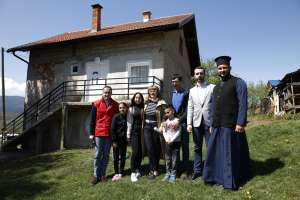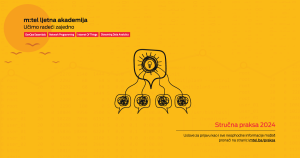SARAJEVO, February 2 (FENA) - High levels of air pollution, limited capacity for water management and waste management, including illegal landfills, uncontrolled construction, industrial pollution and other environmental problems combine to make Bosnia and Herzegovina one of the countries with the worst effectiveness regarding the protection of the environment in Europe, said the Deputy Head of the OSCE Mission to BiH Dmitry Iordanidi in an interview with FENA, emphasizing that according to the European Environment Agency, more than a quarter of deaths in BiH can be attributed to environmental factors, which makes it the highest percentage in Europe.
The OSCE, as the world’s largest intergovernmental security organization, takes a comprehensive approach to security issues. Here in BiH, among other issues, the OSCE Mission is also engaged in raising awareness on environmental issues and some capacity building efforts in this regard. What are the main objectives of the Mission in this area?
As you highlighted, the OSCE’s comprehensive approach to security positions the Organization as a unique forum for political dialogue on a wide range of security issues and a platform for joint action to improve the lives of individuals and communities. Recognizing the close connection between the environment and security, the OSCE aims to strengthen co-operation on environmental issues as part of a broader effort to prevent conflict, build mutual confidence and promote good neighbourly relations. In BiH, we work with authorities and civil society to addresses challenges in environmental protection. This includes improving public access to information and participation in decision-making affecting the environment, strengthening the capacities of the BiH Network of Aarhus Centers and other relevant CSOs, training future lawyers on environmental law and supporting local-level efforts to directly involve citizens in protecting the environment.
What do you consider to be the main environmental problems in Bosnia and Herzegovina?
Unfortunately, high levels of air pollution, limited water management and waste management capacities, including illegal waste disposal sites, uncontrolled construction, industrial pollution, and other environmental problems combine to make Bosnia and Herzegovina one of the worst environmental performers in Europe. These environmental problems compromise the living standards, health, and security of the people of BiH, posing a serious obstacle to sustainable development in the country, by causing disease and premature death, endangering livelihoods, and damaging relations between and within communities. According to the European Environment Agency, over a quarter of deaths in BiH are attributable to environmental factors, the highest in Europe. The World Bank recently estimated that fine particulate matter (PM 2.5) air pollution alone causes 3,300 premature deaths in BiH every year and the loss of over 8% of GDP. An inadequate focus on the environment at the highest levels of political decision-making, a lack of expertise on environmental law, and limited public awareness of the negative impacts of environmental degradation combine to hinder positive change in this area.
You mentioned that the Mission aims to improve public access to information and participation in decision-making affecting the environment. How do you plan to achieve this, considering that citizens in BiH seem to be uninterested in these issues until they affect them directly?
It is true that citizen participation in environmental decision-making is still at a low level, but I wouldn’t attribute this to a lack of interest in environmental issues. For example, a Mission survey just conducted in Central Bosnia Canton (results to be published soon) found nearly all respondents to be concerned about the state of the environment in their place of residence and globally and prepared to change their habits and behaviour. Young people in BiH are especially conscious of environmental issues and this has been shown by various perception surveys. However, it is true that a lack of engagement by citizens and a lack of meaningful public consultation and discussion often gives a free hand to those pursuing policies and projects to the detriment of the environment and the health and well-being of citizens. BiH acceded to the so-called Aarhus Convention back in 2008.
This Convention establishes a number of rights of the public (individuals and their associations) with regard to the environment, including the right of everyone to receive environmental information that is held by public authorities, the right to participate in environmental decision making and the right to challenge public decisions that have been made without respecting the two aforementioned rights or environmental law in general.
Unfortunately, as with many other international conventions and standards, the BiH authorities fall short in implementing the Convention. Shortcomings observed by the OSCE-supported BiH Network of Aarhus Centers include limited awareness amongst citizens on their rights deriving from the Convention, a lack of capacity or general unwillingness of public authorities to fully implement the provisions of the Convention as well as numerous obstacles to accessing justice in environmental matters. These deficiencies allow environmental degradation to go unchecked, putting the quality of life, health, and security of the people of BiH at risk.
For this reason, we in the Mission are working to raise awareness of citizens on the Convention and their environmental rights, but also responsibilities, when it comes to participating in environmental decision-making processes. Because, citizens often become active when it is almost too late – policies have already been adopted, plans have already been developed, funds have been spent and only when the environmental consequences of these actions begin to affect their health and well-being, do they become vocal and more active. To be clear, this, of course, is not their fault; the authorities should be transparent in their decision-making, including by informing citizens about their rights and responsibilities and by taking responsibility for the protection of public health and well-being. Unfortunately, this is currently not the case. Therefore, it is crucial that citizens hold the authorities responsible for all actions affecting their lives, including through engaging in all discussions and initiatives that might have an impact on the environment.
How can we become more active? How to encourage citizens to participate in the decision-making processes when we still have irresponsible citizens who pollute the environment every day without any awareness or consequences?
That is another incredibly important issue. Only when people become aware of the impact of their own actions on the environment and consequently on their own health and well-being, we can talk about participation in decision-making processes. For example, we hear and read about hazardous air pollution in BiH, especially during winter, and all citizens will agree that it is unacceptable and must be solved.
However, not many of them will consider, for example, switching from coal to a more environmentally friendly means of heating, or using public transport, carpooling or cycling instead of driving. We understand that some of these changes require financial investment, but many are feasible with minimum efforts or funds – such as carpooling. And let’s be clear, this is not something that is specific just for BiH. Other countries in the world also faced this problem at one point. For every environmentally conscious citizen comes one that is not, but for those, there are strict penalties in place, so you have to pay a large amount of money to be unconscious.
The OSCE Mission to BiH is trying to lead by example, working in accordance with a so-called Green Pledge. A few years ago we started updating our large car fleet, replacing older vehicles with cleaner hybrid ones. We now have a large fleet of hybrid cars, lowering our fuel consumption (and emissions) as a result. We also follow the Zero Plastic principle in our premises, so we have drastically reduced or eradicated plastic bottles, cups, and other single-use items not just in our Head Office but in all field offices as well.
As for how citizens can get engaged, there are many organizations and initiatives calling for civic participation to strengthen their environmental protection efforts. For example, a national network of Aarhus Centres was formed in 2013 under the auspices of the OSCE Mission to Bosnia and Herzegovina as a platform for exchanging information between competent authorities on the one hand and the public on the other. It encourages transparency within the work of public bodies and enables citizens to voice their views and concerns on decisions that may have an impact on the environment. The BiH Network of Aarhus Centers comprises four Aarhus Centers based in Banja Luka, Sarajevo, Tuzla and Zenica. The Aarhus Centers are part of a broader OSCE-wide network that covers 15 countries in South-Eastern Europe, Eastern Europe, Central Asia and the South Caucuses.
We are currently witnessing the degradation and destruction of rivers in BiH, either through pollution or through the “tsunami” of small and mini-hydropower plants being constructed. Some hydropower projects have been suspended as a result of citizens’ engagement, but what more can we do to protect our rivers?
Bosnia and Herzegovina has astonishing water resources, including beautiful rivers and springs, but unfortunately, not enough is being done to protect this amazing treasure. Rivers and their canyons and valleys represent a significant natural resource and potential for the sustainable and responsible development of local communities and any initiatives or actions that affect these natural resources must respect the principles of the Aarhus Convention and must be in line with the highest environmental standards.
That is why the Mission commended the adoption of the Declaration on the Protection of Rivers by the FBiH House of Representatives, as well as the conclusion requesting the revision of all concessions issued so far for mini-hydropower plants that have been built and those that are in the construction phase. And this is what I highlighted above – this action should allow for the full implementation of one of the main principles of the Aarhus Convention, providing adequate conditions for public participation from an early stage in the decision-making process and ensuring that public opinion is properly taken into account.
It is important to emphasize that well-governed water resources are essential to maintaining public health and a sound environment, as well as to foster stability. Co-operative water governance is a catalyst for sustainable development and comprehensive security and requires the accountable, transparent and fair management of water resources. This also contributes to confidence-building and is essential for preventing water-related conflicts at all levels, including at the level of local communities.
What also seems to be a big problem in BiH is the large number of illegal waste disposal sites that practically nobody is controlling. How is this possible and can the Mission do something about it?
Waste treatment remains one of the biggest problems in BiH, despite some waste-management framework laws adopted. Official estimates put the number of wild dumps in BiH at over 1,000 whilst only 1% of municipal waste is recovered for recycling. The present waste management system in BiH does not record data on waste generation, collection, treatment, recovery and disposal in a comprehensive and structured way. And major problems are not only related to household waste. Most cities in the country lack an organized system for the collection and disposal of used oils, batteries or accumulators, tires, electrical equipment, vehicles, agricultural waste (animal and plants), medical waste, expired medicines, pesticides and similar products.
Hazardous waste and chemicals, if not properly managed, can have a grave impact on the environment and public health as they can contaminate water, soil and the atmosphere.
Again, we come back to the very source of the issue – a lack of responsibility by the authorities that should provide adequate waste disposal sites, with collection and recycling options and with clear penalties for those who do not obey. On the other side, some citizens are not aware that by illegally disposing of waste they directly jeopardize their health and the health of their children, not to mention other citizens and the environment in general. Again, it is up to the authorities to establish an effective waste management system that will be accessible to citizens and that will handle all waste in the most environmentally friendly manner as possible.
Is engaging the youth a solution? Do young people have more awareness about these issues? After all, they will inherit the environment we are polluting right now. And it seems like their air and water will be polluted if something doesn’t change urgently?
This is an area where the Mission sees enormous potential and this is why we have been engaging with young people for the past few years in order to, first, raise their awareness on environmental issues and, second, encourage them, by building their capacities and knowledge, to engage and act.
For example, the Mission, in co-operation with Aarhus Center Sarajevo, organizes an annual, semester-long Environmental Legal Clinics Program for law students, currently from two universities. Through a combination of expert-led lectures, workshops and field trips, students have an opportunity to learn about environmental legislation and cases, including those relevant to the implementation of the Aarhus Convention, whilst also further developing their research, case preparation and advocacy skills. After the completion of the Program, successful students have a chance to apply for volunteer opportunities with the Aarhus Center Sarajevo to gain further practical experience on environmental cases and to give back to the local community. We will continue this activity in 2021.
Furthermore, the Mission, together with faculties from Banja Luka organized an essay competition for students on the topic of “Ecological incidents in Bosnia and Herzegovina and their possible solutions”. We are very pleased to have received many essays, covering a variety of issues, including the disposal of COVID-19 medical waste, reducing the environmental footprint, and the pyralene chemical leak in Banja Luka a few years ago. This showed us that young people are becoming more and more aware of the consequences of river and air pollution, illegal waste disposal and the proliferation of small hydro plants on their health and well-being.
Recognizing that a clean and safe environment is in the interests of all citizens, the OSCE Mission to BiH will continue to work to raise awareness and promote collective responses to the manifold environmental challenges that BiH faces, concluded in an interview with FENA the Deputy Head of the OSCE Mission to BiH, Dmitry Iordanidi.
(FENA) S. R.









